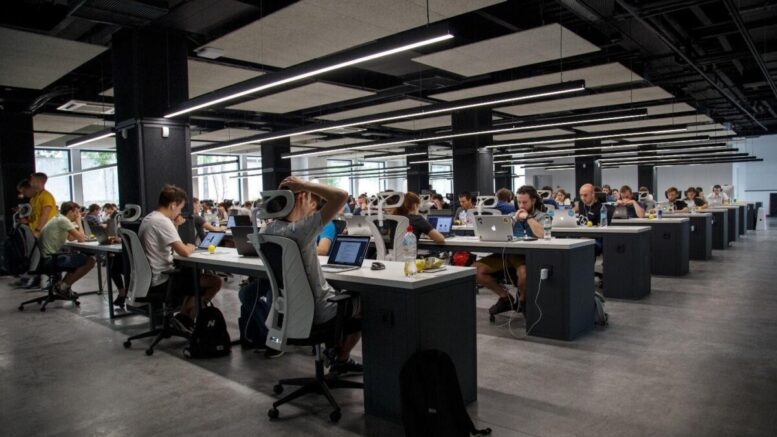Whether you are easily agitated or relatively calm, stress is a reality of life. It impacts all of us, notably when we are stuck in our workstations. And, regardless of whether we want it or not, we all need some assistance with stress management.
Coworking is an excellent approach to lessen your work-related stress. For starters, it can assist you in reducing your daily commute. It can also offer you freedom by alleviating the pressure of a demanding workspace. However, coworking is not without its drawbacks. Burnout can be caused by an impending deadline, spending a lot of time on a computer screen, or a pretty challenging assignment. Being conscious of how you’re feeling and incorporating some basic stress-relieving routines into your daily life can make a huge difference.
Why is it necessary to maintain calmness at work?
It’s critical to be calm at your workplace because you’re more likely to think logically. This, as a result, will enable you to make good calculated decisions. A quiet demeanor might come across positively when you’re addressing a group of people, conducting a workshop, talking about a problem with a colleague, or pitching to your boss why you deserve a promotion or a raise. When you are calm, you’re more likely to remain positive, which improves your relationships with your colleagues.
Here are a few basic strategies to keep calm in a coworking space:
Take Breaks
No matter how hard you try to avoid discomfort at your co-working space, it’s still likely that you may experience it. In case this occurs, it’s advisable to take a break. Count to ten, go for a stroll, talk to a coworker, get a cup of coffee, or try some of the best CBD gummies for anxiety. You might be overwhelmed by your duties and find it difficult to think clearly. Pulling away from the issue for a short while can assist you in relaxing and approach a problem in a better way.
If you think you’re susceptible to work-related stress, try to figure out what triggers these emotions so you can prepare for them and take action to avoid them. Take a break if you feel your anxiety levels rising, and you’ll realize that your level of discomfort will decrease.

Stay Focused
Multitasking might make you feel like you’re getting a lot done, but it can also leave you feeling stressed as you hop from one project to another. Eventually, you may discover you haven’t completed a single task, despite feeling like you’ve covered a lot. So rather than juggling many projects or tasks, and hopping between emails and projects, try concentrating on one activity.
When you complete one project, cross it off your checklist and proceed to the next one. Doing this will motivate you and make you feel accomplished. Remaining focused and managing to complete several tasks can also assist you in maintaining momentum as you move on to the next set of tasks.
Staying focused goes beyond tasks. Therefore, consider concentrating only on things you can control. There could be many uncontrollable events at your co-working space, but recognizing what you can control and what you can’t, will help you stay calm while you tackle these issues and find solutions.
Engage In Something You Enjoy
When you’re caught up in a tight situation while working, it’s easy to get sucked into pessimism. Doing this will only worsen the situation. Your negativity will make it more challenging to have a constructive and positive dialogue afterward. Instead, take some time off from the dispute and engage in something you love. This could involve listening to your favorite track on your phone or scrolling through recent family photos. It could also involve calling a dear friend or your spouse to check in or even taking a walk outdoors for some fresh air.
You’re not just separating yourself from your stressful situation; you’re also substituting it with something that can help you change your outlook and improve your mood. After only a few minutes of focused attention on something that provides you pleasure and joy, some of the anxiety and stress will eventually fade away. Now you can go back to that discussion with a more positive attitude, rather than returning with more wrath and increased hostility.

Set Your Boundaries
We have evolved into a society that values accessibility. As a result, it is normal for workers to engage in workspace politics that require them to work extra hours and socialize outside the workspace to get ahead. When such tendencies combine with the expectation that we should be accessible via cellphone, mail, or message at all times, we have very little time left for ourselves.
It’s critical to be very explicit with others and yourself about your life/work limits. The stress of always being “on” can quickly result in work burnout, which is a significant problem with long-term consequences. Remember that skipping cocktails after leaving your workspace to go home and unwind is entirely acceptable, as is refusing to respond to messages or emails after 9 pm. Set your boundaries and abide by them.
Recognize and Assess Self-Inflicted Stress

Like in life, there are two kinds of job-related stress: external and internal. External stressors like poor leadership, work overload, and workspace politics are out of our control. However, a large portion of our anxiety is internal stress. Self-imposed stress makes external situations more difficult to manage.
Shut down any internal conversation that suggests that you aren’t doing enough or that you aren’t intelligent, skilled, or knowledgeable to make it professionally. This self-defeating mental pattern amplifies every failure and leads to increased levels of stress and anxiety.
In such situations, consider the following:
- Do facts support my thoughts, or are they my assessment of the situation?
- Is it reasonable to assume that the worst-case scenario will occur? How plausible is it?
- Is what I’m worried about currently going to matter in a week, month or year?
Disrupting a perfectionist way of thinking can be enough to stop it, and when you truthfully address these questions, you’ll frequently discover that you were overburdening yourself for no reason. It’s a lot easier to get over stress once you realize you’re placing too much pressure on yourself. Stop whatever you’re doing if you find yourself falling into a negative way of thinking. Breathe profoundly and conduct a self-assessment.
The Bottom Line
Stressful circumstances will arise in your co-working space, making it challenging to maintain your composure when pressure increases and emotions run high. Fortunately, you have control over your reaction in such circumstances, and you can apply the mentioned strategies to help you relax.
